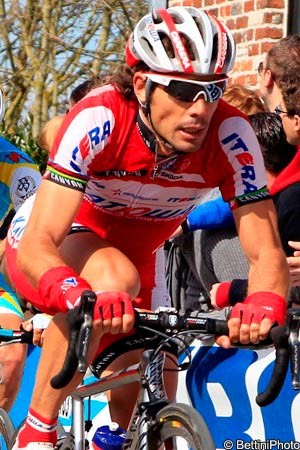“If many had thought like me, cycling would be different”
 The recently-retired Oscar Freire has spoken of his disappointment with the Armstrong case and the way it has affected how cycling is perceived, saying that those who dope have made life difficult for others who do not break the rules.
The recently-retired Oscar Freire has spoken of his disappointment with the Armstrong case and the way it has affected how cycling is perceived, saying that those who dope have made life difficult for others who do not break the rules.
“Before we were heroes and today we are suspects. It’s a shame,” he told ABC.es, in a long interview about the subject of banned substances.
“People think all cyclists do the same and that is not the case. The controls are much more comprehensive now, things are better,” he said.
Freire is regarded as one of the most talented riders who has raced in the peloton in recent years, winning three road race titles and thus equalling the record held by Alfredo Binda, Rik Van Steenbergen and Eddy Merckx. He was one who could win on little training, and was able to get into shape very quickly.
“You can do professional cycling with resorting to doping, but everyone chooses their own story,” he explained, when asked about the decisions riders make in this area. “I followed my own path no matter what others did or did not do. I’ve never had any problems with anything. If many had thought like me, cycling would be different.”
Freire suggests that greed is one of the big issues, with either people who don’t have talent taking banned substances so that they can be successful, or those who are good in certain areas using the same products to push themselves into bigger results than they are naturally capable of.
“You can win many other races which are not the Tour, and say no,” he said, explaining the importance of accepting your own level. “The problem with this sport is that many don’t deserve to be cyclists [in terms of ability – ed.] and it is best to go elsewhere rather than fill it with dirt.”
For those who have taken the path of doping to succeed, Freire voices a certain amount of frustration. “There have been very clear cases. And in the end many have tested positive,” he said. “They have done much damage to cycling, which we practice, from which we make a living. And of course I feel that we have lost victories, prestige and money.
“It’s because of the ambition people have, because of their economic interests.”
Much has been said about the pressures riders can face from others to toe the line, to accept the programme and to do what they are told. That may perhaps have been more of an issue in the past when there were co-ordinated doping structures on teams and also such unfettered use of products that it was extremely difficult to survive on bread and water.
However it is generally accepted now that things have been dialled back sufficiently by the biological passport and other initiatives that it is is now possible to race well – and to win – when riding clean.
Freire is clear that whatever the pressures, the decision what to do primarily rests with the rider, and nobody else.
“In the first place, the blame belongs to the cyclist because he decides what he does with his body, his life and his sport,” he said. “Of course there is always pressure. From within, from the public, from the team, from the system. But you can say no. I have to emphasize that the teams have improved a lot in this are and the mentality is much more positive than before.”
Freire speaks of frustration with riders such as Armstrong and the US Postal Service team, but also states that in general he has kept his own views rather than attacking those who choose a different path.
“I have earned the respect and am respectful of others. I am not one of those who think ill of others in the system,” he said. “What happens is that there is a lot of hypocrisy in the bunch. Many who complained of others, have tested positive or were involved in relationships with physicians.”
He’s now retired from the sport, calling it quits after a season with the Katusha team. He was offered other contracts, with some teams telling him he could race for a period and then go into a management or coaching role, but he decided to walk away and experience life outside cycling. He may return at some point to take upa role guiding those who are still racing, but that decision will be made down the line.
It is hoped that if he does ultimately come back to the sport, that he will speak to riders about accepting their level, setting realistic goals and making the right choices.